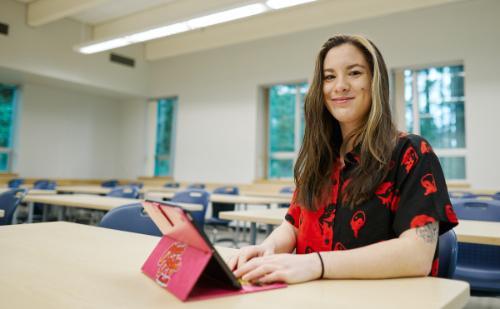One-on-One with Adrienne Argent
Published29 February, 2024
Photo credit Patrick Leung
Meet Adrienne Argent, faculty member in the School of Education & Childhood Studies at Capilano University and a pedagogist at the University Children’s Centre.

With over three decades of experience, Argent works closely with children, educators and students to develop an Early Childhood Care & Education (ECCE) curriculum that addresses current needs in the profession.
In this interview, we explore Argent’s career highlights and her views on the evolving field of early childhood care and education.
Introduce yourself and tell us about your professional journey.
I am a faculty member in the Early Childhood Care and Education program and I recently celebrated my 30th anniversary of working at Capilano University. I studied early childhood education here when CapU was a college and our program was quite small.
For 25 years, I worked as an early childhood educator in the Children’s Centre, while also pursuing various degrees in early childhood education.
Now, I work in the faculty, and I also have a role called a “pedagogist.” I am very connected to the Children’s Centre with that role and my work.

What has kept you in this profession for so long?
Early childhood education is a fascinating, meaningful and complex profession. I have had the privilege to work alongside strong feminist leaders and radical creative thinkers who have encouraged me to think about the type of education we want to create for children.
It’s important to consider the type of child we are shaping through early childhood education and how they will navigate this world. It is an evolving educational project.
I think of it as a movement that I want to participate in and carry a concern for the well-being of children and families.

What do you love the most about working in this field?
It is incredibly satisfying for me as an instructor when students are well-supported in their practicum.
I love the process of welcoming early childhood education students into the Children’s Centre to complete their practicum. Witnessing the mentorship that develops between educators and students is particularly fulfilling.
Practicum is where theory meets life. Here students learn how to respond to children, make ethical decisions and create conditions where children can think together.
What are the challenges you’ve experienced in your career?
One of the most important aspects of the educator’s role is to learn how to read and respond to situations and complex children with complex ideas and identities.
“I want to instill in my students the ability to be flexible and experimental and know how to respond to unpredictability.”
What qualities or skills do you aim to nurture in your students?
We must nurture in our students the ability to make ethical decisions. Our work requires it, and every moment with children demands an ethical response.
Another quality I aim to instill in students is the ability to articulate the work that we do.
Our profession is often misunderstood and sadly undervalued, so articulating our work and its complexity to families, policymakers and others outside the profession is crucial.
What is a common misunderstanding about early childhood education?
Providing care is easy and doesn’t require critical thinking. People also often assume women naturally or inherently know how to do it.
It’s important to be able to explain the critical thinking behind every decision about care in a busy classroom with diverse children. This also helps elevate the profession’s status.
Tell us something that students might not expect to know about you.
I am passionate about food and cooking. I appreciate the role food plays in my relationships with others.
It’s a significant aspect of my life and I enjoy food that nourishes my body and my connections with friends and family.
School of Education & Childhood Studies
Learn more about CapU’s Bachelor of Early Childhood Care and Education degree program.
Find out moreWhat advice would you give to ECCE students?
My advice is to be bold. Ask challenging questions of yourself and your colleagues. These questions should inspire you to try different approaches when interacting with children.
Work on your relationships with others. Be the educator who isn’t afraid to make radical changes and shifts in thinking to ensure every child and family feels welcome at your centre.



